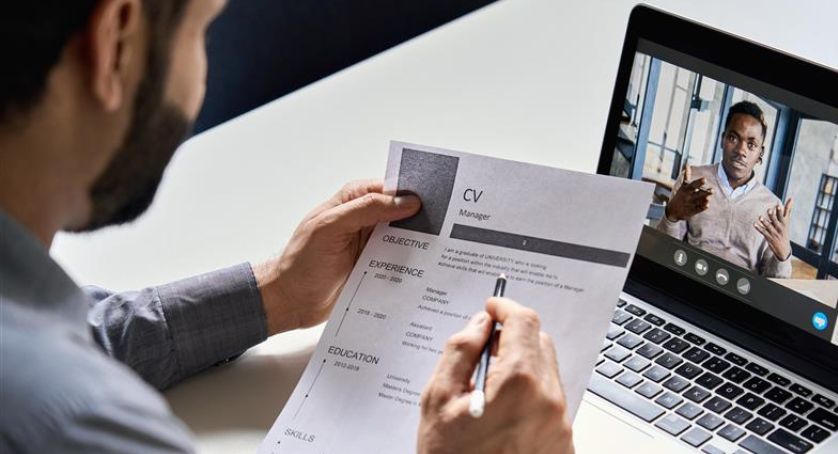What the Olympics Can Teach Us About Teamwork
The 2026 Winter Olympics kicked off this month in Italy, and whether you’re watching the games or not, there’s nothing...

You’ve scoured all the job posting sites, submitted more applications than you can count, and now—you’ve finally landed an interview with your dream company. Congratulations! Reaching this stage is a significant milestone. According to research from Zippia, the average job seeker applies to 27 companies before landing a single interview. And with only about 20% of the 118 applicants for any given job making it to the interview stage, it’s completely normal to feel both excited and nervous for what comes next:
The interview itself.
Job interviews can be intimidating, but they don’t have to be. If you prepare for an interview ahead of time, you’ll feel more relaxed, confident, and ultimately more likely to land the job of your dreams. Here are five essential tips to help you prepare effectively, and more importantly, to help you ace your interview.
Before your interview, take time to understand what the company does, its mission, and its culture. Visit the company’s website, job board listings, and social media profiles. Look for recent press releases that discuss recent happenings within the organization. If they have a blog, you can read a few of their recent articles as well and take note of anything you find interesting.
Understanding the company’s place in its industry and being able to speak to its values or recent accomplishments shows initiative. You can reference key items in your interview to demonstrate your knowledge of the company or use them to craft thoughtful questions for the interviewer. This kind of homework demonstrates that you’re genuinely interested and invested in the organization and are prepared to put your best foot forward.
You likely reviewed the job description when you applied, but take a closer look before your interview. You’ll want to review the job description closely and match up any relevant experience and qualifications you may have.
You can also use the job description to anticipate questions the interviewer may ask and try to tailor your responses to best fit what they’re looking for—whether that’s cultural fit, specific technical skills, or problem-solving capabilities. This strategy also helps ensure that your answers highlight your most relevant strengths.
While you can’t predict every question, practicing most commonly asked interview questions can significantly ease nerves and better prepare you. Don’t memorize answers word-for-word—sounding robotic can hurt your chances. Instead, jot down key talking points you want to hit, and rehearse enough that you can respond naturally and confidently.
Remember to cover the most important question— “So tell me about yourself.” Rehearse your elevator pitch and the key points about your history and work experience that best align with the company and role. Keep it short, no more than 90 seconds, but make sure to provide your top highlights to convey to the interviewer that you’ll be a good fit for their organization.
If you have a friend or family member willing to show off their acting skills, you can take the interview preparation one step further and conduct a mock interview. Have them ask you standard interview questions so you can rehearse your answers in a more realistic setting.
You can also practice soft skills like a firm handshake, making eye contact, and exuding confidence when speaking. If your interview will be on video, practice in front of your camera to ensure proper lighting, audio, and a distraction-free background.
When the day of your interview arrives, you’ll want to do everything possible to make the best first impression. In fact, 30% of interviewers make a decision about the candidate within the first five minutes of the interview.
Start with your wardrobe and opt for formal business attire with clean, pressed clothes that fit well. It’s always better to dress more formally for an interview than you think you may need to if you’re hired for the role. Make sure you’re clean and well-groomed, as well. For video interviews, you’ll still need to look nice and ensure you sit in front of a neutral background in a quiet location to avoid distractions.
If you’re going for an in-person interview, preview your route so you know where to go ahead of time. Be sure to leave with enough time to arrive at least 15 minutes early, that way you have a cushion if there happens to be traffic or you get lost along the way. Bring at least two printed copies of your resume, and when you arrive, greet the interviewer with a firm handshake and a confident smile.
After the interview, don’t forget to send a thank-you email to the interviewer. This small gesture goes a long way—68% of interviewers think that sending a thank-you email afterwards matters. Keep it brief but thoughtful: thank them for their time, express enthusiasm about the role, and reinforce why you’re a great fit.
Job interviews can be nerve-wracking, but taking the time to prepare for an interview ahead of time is the key to shaking off the jitters and putting your best self forward. And if you don’t succeed with your first interview, don’t stress out—each interview you complete is practice for the next one. With each one, you’ll become more confident—and closer to the right role.